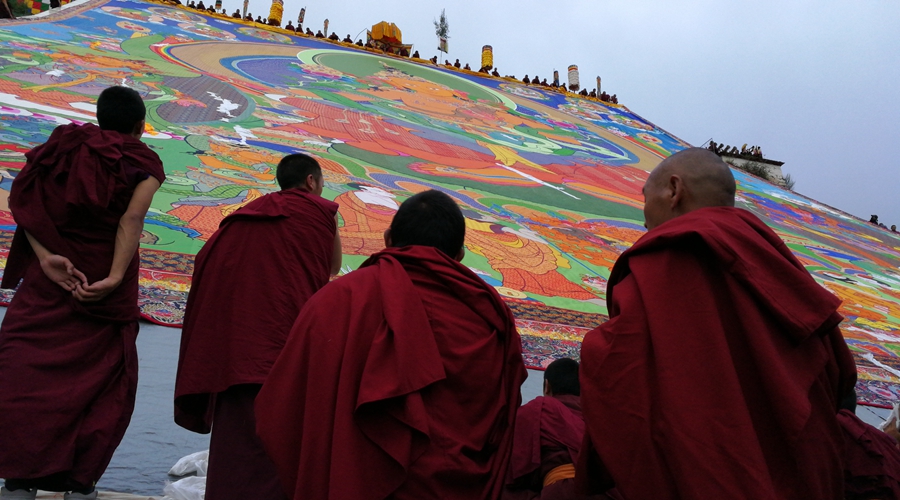World cultural heritage Sho Dun Festival celebrated in Tibet
- By Zhang Jiaqi
 0 Comment(s)
0 Comment(s) Print
Print E-mail China.org.cn, August 22, 2017
E-mail China.org.cn, August 22, 2017
|
Lamasstand by the Buddha Thangka on the mountainside. On August 21, the Sho Dun Festival, a traditional Tibetan festival for displaying the Buddha, eating yogurt, and watching Tibetan opera, opened in Lhasa, southwest China. [Photo by Yang Jia/China.org.cn] |
The day started in the early morning with people walking towards the Buddha display platform along the mountain road. Despite the drizzle, Tibetans headed for the display dressed in colorful traditional clothes, and prayed for blessings during the display.
“Sho Dun” means eating yogurt in Zang language, and the Sho Dun Festival is also commonly known as the Yogurt Festival. Temporary service stops were set up along the bituminous roads to the Drepung Monastery. On their way back, people stopped at the service stops to eat the yogurt.
Basang Zhuoma, a new university graduate from Tibet, arrived for the Buddha display and prayed for blessings along her way down the mountain. She said, the Sho Dun Festival is a traditional Tibetan festival to pray for blessings, and more importantly, it is a world cultural heritage. Her annual pilgrimage is not only to receive blessings, but also to play her part in preserving the culture.
Tibetans performed various Tibetan operas to celebrate the Sho Dun Festival. After watching the performance at the plain area by the mountainside near the monastery, people flocked to the Norbulingka Palace to watch the opera, and picnicked on the lanes with buttered tea and other local snacks.
Zhong Lijuan, a Tibet-aid doctor, brought her four-year-old son to the Norbulingka Palace for the intangible cultural heritage exhibitions there.
“There is the holiday during the festival, and I think it is a good opportunity to take him here to have a look.” Zhong and her husband are both Tibet-aid staff who have worked there for over 10 years.
The annual celebration of this world cultural heritage will last until August 27, and other diverse activities such as photo exhibitions and horse racing will be held in the following days.





Go to Forum >>0 Comment(s)